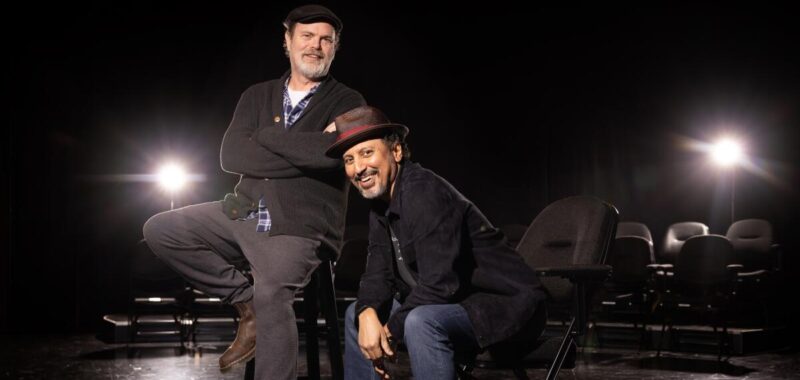
Aasif Mandvi, one of the leads in a new production of “Waiting for Godot” opening Thursday at L.A.’s Geffen Playhouse, is sitting on a couch, recalling the dearth of roles for South Asian actors in 2003, when he played a Taliban minister in Tony Kushner’s “Homebody/Kabul.” Mandvi’s co-star, Rainn Wilson, leans in.
“I thought you were Cuban!” Wilson deadpans.
Mandvi doesn’t miss a beat.
“I’ve told you a million times, I’m not Cuban,” he says with mock exasperation.
“You could play Cuban,” Wilson says.
“I’ve played Cuban, but I’m not Cuban,” Mandvi says.
“You should change your name, you really should,” Wilson persists. “Like, Antonio Mandivosa. You would work nonstop.”
Mandvi shakes his head, ribbing Wilson right back.
“You’re so white right now,” he says.
They both laugh.
The two men are in the midst of recounting their early days in theater, when Wilson didn’t make more than $17,000 annually for years and Madvi toured Florida with a production of “Aladdin” for kids so young they occasionally peed their pants during the performance.
For his first show in New York, Mandvi played Hector in Shakespeare’s “Troilus and Cressida.” The production took place at the back of a restaurant in Brooklyn, and the audience consisted of maybe a dozen people. The mother of the guy who played Troilus made all the costumes, Mandvi recalled, and so he came out onstage with a cardboard sword with a crease in it.
“I’d been through drama school, I was a professional!” Mandvi says with a laugh. “It was the most insane thing. But this is to say that you just get onstage and do whatever you can to get seen, to build your résumé.”
It’s funny to think of a time when either actor still needed to build his résumé. As two of modernist theater’s most iconic misfits — Vladimir (Wilson) and Estragon (Mandvi) — the actors will take the stage as bona fide stars. Although Wilson will always be associated with the gullible and weaselly Dwight Schrute on NBC’s “The Office,” and Mandvi recently won a devoted fan following for his portrayal of the science-minded skeptic Ben Shakir in “Evil” on Paramount+, both men refer to theater as their first — and biggest — love.
“The entire reason I came to Los Angeles, and I am not even exaggerating one iota, is I knew that if I ever wanted to play Mercutio at the Public Theater, I was gonna need to be on a TV show,” Wilson says. “That’s just the reality of New York theater. They want to sell tickets.”
Wilson has stayed in L.A., but he still talks about going back with the goal of playing some of those great roles. Which is why he jumped at the chance to work on “Waiting for Godot.” He performed a scene from the play in acting class at the University of Washington in 1986 and ended up marrying his scene partner, writer Holiday Reinhorn. Since then, he’d always dreamed of revisiting it. Mandvi also performed “Godot” in acting class long ago, and the play has long been on his bucket list.
The Geffen production is exciting to both actors because it’s presented in association with the Irish theater company Gare St Lazare Ireland, which specializes in Beckett’s work.
“I’ve rarely been this challenged before as an actor,” Wilson says. “I played Hamlet in college, and I will say this is harder because everything is subject to interpretation.”
Wilson throws out an example. He has a line in the middle of the play that reads, “In an instant, all will vanish and we’ll be alone once more in the midst of nothingness.”
“You could play that line with all the darkness and sincerity that you can muster, and it might really strike a chord in the the heart of the audience, or you could put a tiny little spin on it and get a big laugh,” he said, thinking about it for a moment. “Yeah, and I’m not sure which way I’m even gonna go with that right now.”
Beckett wrote “Waiting for Godot” in the late 1940s after World War II, during which he was part of the French Resistance. The play, which centers on two ragtag characters waiting in vain for a man named Godot, delivers some of 20th century theater’s most closely parsed lines. It premiered in1953 at the Théâtre de Babylone in Paris and ever since has been endlessly analyzed and explained by academics, critics and theater lovers bent on uncovering its meaning.
“It presumes the ultimate thesis, which is, we don’t know what we’re doing here, or why we’re here,” Mandvi says. “We just pass the time.”
Mandvi and Wilson are the same age, 58, and shared the same agent in the mid-’90s when they were starting out, but they had never worked together.
“It just sounded like a blast, right?” Mandvi says. “ I was like, ‘Oh, I get to work with Rainn who I’ve always admired and watched and —’”
“Been oddly attracted to,” Wilson interrupts.
Mandvi nods slowly.
“Been oddly attracted to,” he repeats before adding emphatically, “which has really diminished.
“He’s one of the few people where the more you know him, the less you like him,” Mandvi continues. “The less you lust, I should say.”
“It’s true,” Wilson agrees.
Up next, the actors suggest: A mashup of “The Office” and “Evil” where the Dunder Mifflin Paper Co. is haunted. Hollywood producers, take note.

